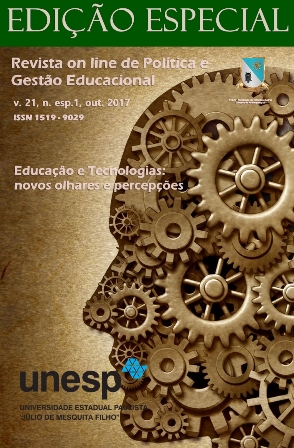THE CONTRIBUTION OF THE PRODUCTION OF DIGITAL VIDEOS BY DISCIPLES OF A MUNICIPAL SCHOOL IN THE CONSTRUCTION OF CONTEXTUALIZED KNOWLEDGE IN SCIENCE TEACHING
DOI:
https://doi.org/10.22633/rpge.v21.n.esp1.out.2017.10452Keywords:
Digital video. Contextual knowledge. Digital technologies. Science teaching.Abstract
This work presents an intervention research and participant that analyzes how the production of digital videos by students of a municipal school brings contributions to the construction of the knowledge contextualized in the teaching of sciences. For this purpose, references were used to cover four thematic areas: the use of digital technologies in the school context; The contextualization of contents in science education; Communication and mediation in school; And finally the production of digital video in science education. The qualitative methodology used, using semi-structured interviews and participant observation. Previously, the beginnings of the work of the students, workshops were created to create digital video, then a semistructured interview was carried out, in the post-production phase, with the students and the teacher. The results show that the production of digital videos have brought significant contributions to the students since participating in the workshop of video production, to the stage of conclusion and presentation of digital video in the classroom. With this, the students used the production of digital video as a differentiated methodology, source of research and production of knowledge. Participants, directors, learners and authors in the elaboration of the video, searching information related to the content, performing readings, planning the production, the "script", accompanying the assembly, using digital technologies in production, disseminating and participating in debates collectively. They constructed the knowledge proposed in science teaching and brought the curricular content studied into practice, reinforcing the discussion about the use and production of digital video as an educational tool.
Downloads
References
BRASIL. Referenciais para a formação de professores. Ministério da Educação – Secretaria de Ensino Fundamental. Brasília. 1999.
BELLONI, M. L.; GOMES, N. G. Infância, mídias e aprendizagem: autodidaxia e colaboração. Revista Educação & Sociedade, v. 29, n. 104 – Especial. p. 717 – 746, out. 2008. p.734.
FREIRE, P. Pedagogia do oprimido. Rio de Janeiro: Paz e Terra, 2005.
FREIRE, P. Pedagogia da autonomia. São Paulo : Paz e Terra, 2010.
FREIRE, W.; RANGEL, M. Educação e tecnologia: texto, hipertexto e leitura. Rio de Janeiro: Wak, 2012.
MARCONDES FILHO, C. Televisão: a vida pelo vídeo. São Paulo: Moderna, 1995.
MORAN, J. M.; MASETTO, M. ; BEHRENS, A. Novas tecnologias e mediação pedagógica. 19. ed. Campinas, SP: Papirus, 2012.
MORÁN, J. M. O vídeo na Sala de aula. Comunicacão e Educacão, São Paulo, (2): 27 a 35,.jan./abr. 1995.
PIMENTA, S. G.; GHEDIN, E. Professor reflexivo no Brasil: gênese e crítica de um conceito. São Paulo: Cortez, 2002.
SALDANHA, L. C. D. Ateleaulaemquestão. #Tear: Revista de Educação Ciência e Tecnologia, Canoas, v.2.n.2, 2013.
SOUZA, R. P. D.; CARVALHO, A. B. G.; MOITA, F. M. C. D. S. C.; MOITA, F. M. C da S. C.; CARVALHO,G. B. A. Tecnologias digitais na educação. Campina Grande: EDUEPB, 2011.
LUDKE, M.; ANDRÉ, M. A. Pesquisa em educação: abordagens qualitativas. São Paulo: EPU, 1986.
SERRANO, G. I.; COLLAZO, W. R. Contribuciones portorriqueñas a la psicologia social-comunitaria. Rio Piedras: Editorial de La Universidad de Puerto Rico, 1992.
SANTOS, W. L. P. Educação científica na perspectiva de letramento como prática social: funções, princípios e desafios. Revista Brasileira de Educação v. 12 n. 36 set./dez. 2007.
SILVA, F. R.; CORREIA, S. E. Novas tecnologias e educação: a evolução do processo de ensino e aprendizagem na sociedade contemporânea. Educação e Linguagem, ano 1, p. 23-25, junho 2014.
SCHNEIDER, C. K.; CAETANO, L.; RIBEIRO, L. O. Ms. Análise de Vídeos Educacionais no youtube: caracteres e legibilidade. Revista Novas Tecnologias na Educação, CINTED-UFRGS, Porto Alegre, v. 10, p. 35-39, 2012.
SANCHO, J. M. Para uma tecnologia educacional. Porto Alegre: Artmed, 1998.
SILVA, R. V.; OLIVEIRA, E. M. As possibilidades do uso do vídeo como recurso de aprendizagem de aula do 5º ano. Pesquisa em educação: Desenvolvimento, ética e responsabilidade social.
TEIXEIRA, A. G. D. Um levantamento de percepções de professores sobre a tecnologia na prática docente.Linguagens e Diálogos, v. 2, p. 159-174, 2011.
TAGLIEBER, J. E. O ensino de ciências nas escolas brasileiras. Perspectiva, Florianópolis, p. 91-111, Jul./Dez 1984.
ZUIN, A. O Plano Nacional de Educação e as tecnologias da informação e comunicação. Educ. Soc., Campinas, v. 31, n. 112, p. 961-980, jul.-set. 2010.












